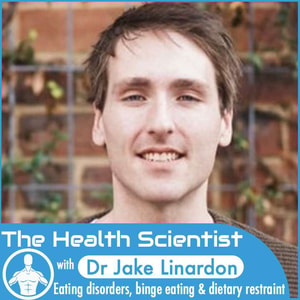Ep.36 Jake Linardon: Eating disorders, binge eating & dietary restraint

Dr Jake Linardon is a Research Fellow at Deakin University, Australia. His research involves evaluating a broad range of treatment approaches for eating disorders, with a keen interest in understanding how we can use innovative technology to better reach those in need. He has published over 40 peer-reviewed papers, is on the editorial board for the International Journal of Eating Disorders and Body Image, and is the founder of Break Binge Eating.
ebook: 5 Proven Steps To Break The Binge Eating Cycle
In this episode we cover:
- Jake's research into eating disorders and his prolific research output
- How Jake's observations of the effects of physique ideals on eating and exercise behaviour led to his research interest
- What are some of the most common eating disorders and how are they diagnosed?
- The role of over-evaluating body shape and weight as a common root in the development of eating disorders
- Is there merit to treating all eating disorders in a similar fashion due to their common root cause?
- Why treating surface symptoms of eating disorders without dealing with the deeper issue results in a much greater risk of relapse
- What are some of the most commonly used treatments for eating disorders?
- The importance of real-time recording of binge eating episodes
- How effective are the commonly used eating disorder therapies?
- Are there certain types of people that are more likely to recover with treatment?
- How likely is it that someone who has "recovered" from an eating disorder may still be suffering the underlying issues?
- How might the COVID-19 pandemic affect people suffering from eating disorders?
- The role alcohol can play in binge eating
- What type of dietary patterns are related to the development of eating disorders?
- What is the difference between rigid and flexible dietary restraint?
- Is "flexible dieting" as it's commonly interpreted a type of flexible or rigid restraint?
- Where does intuitive eating fit in with flexible and rigid dietary restraint?
- Is there evidence for the use of intuitive eating in the treatment of eating disorders?
- Jake's free E-book to help people suffering with binge eating
- How can people in the fitness/nutrition industry ensure they aren't promoting disordered eating?
